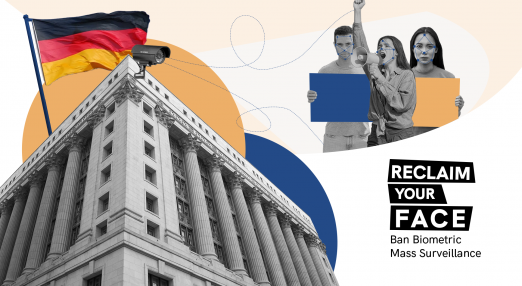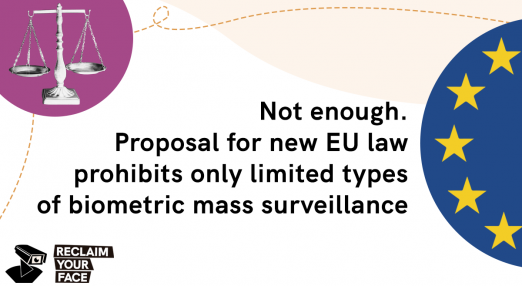Biometrics
Biometrics refers to the use of analytical tools and devices which capture, record and/or process people’s physical or behavioural data. This can include faces (commonly known as facial recognition), fingerprints, DNA, irises, walking style (gait), voice as well as other characteristics. Under the EU’s data protection laws, this biometric data is especially sensitive. It is linked to our individual identities, and can also reveal protected and intimate information about who we are, where we go, our health status and more. When used to indiscriminately target people in public spaces, to predict behaviours and emotions, or in situations of imbalances of power, biometric surveillance such as facial recognition has been shown to violate a wide range of fundamental rights.
Filter resources
-

New win against biometric mass surveillance in Germany
In November 2020, reporters at Netzpolitik.org revealed that the city of Karlsruhe wanted to establish a smart video surveillance system in the city centre. The plan involved an AI system that would analyse the behaviour of passers-by and automatically identify conspicuous behaviour. After the intervention of EDRi-member CCC the project was buried in May 2021.
Read more
-

Challenge against Clearview AI in Europe
This legal challenge relates to complaints filed with 5 European data protection authorities against Clearview AI, Inc. ("Clearview"), a facial recognition technology company building a gigantic database of faces.
Read more
-

From ‘trustworthy AI’ to curtailing harmful uses: EDRi’s impact on the proposed EU AI Act
Civil society has been the underdog in the European Union's (EU) negotiations on the artificial intelligence (AI) regulation. The goal of the regulation has been to create the conditions for AI to be developed and deployed across Europe, so any shift towards prioritising people’s safety, dignity and rights feels like a great achievement. Whilst a lot needs to happen to make this shift a reality in the final text, EDRi takes stock of it’s impact on the proposed Artificial Intelligence Act (AIA). EDRi and partners mobilised beyond organisations traditionally following digital initiatives managing to establish that some uses of AI are simply unacceptable.
Read more
-

Can a COVID-19 face mask protect you from facial recognition technology too?
Mass facial recognition risks our collective futures and shapes us into fear-driven societies of suspicion. This got folks at EDRi and Privacy International brainstorming. Could the masks that we now wear to protect each other from Coronavirus also protect our anonymity, preventing the latest mass facial recognition systems from identifying us?
Read more
-

Washed in blue: living lab Digital Perimeter in Amsterdam
An increasing amount of Dutch government agencies seem to resort to so-called ‘living labs’ and ‘field labs’ in order to test and experiment with technological innovations in a realistic setting. In recent years, these live laboratories have proven to be a useful stepping stone to introduce new technologies into public space. In the last several weeks, EDRi's member Bits of Freedom took a closer look at one of those living labs – the so-called Digital Perimeter surrounding the Johan Cruijff ArenA in Amsterdam – and were not pleased with what they saw.
Read more
-

EU Parliament adopts the Covid Pass: risks for data protection and new forms of discrimination
At first glance, teh Digital Green Certificate may sound interesting, but upon further reflection, it quickly becomes clear that the proposed system has the potential to divide society and expose certificate holders to far-reaching surveillance by the authorities that issue the documents. Even worse, it exacerbates inequalities and increases social exclusion, shares EDRi's member epicenter.works.
Read more
-

Initial wins in Italy just two months after the launch of Reclaim Your Face
Last week, the #ReclaimYourFace campaign reached two important milestones at the national level. On Friday April 16th the Italian Data Protection Authority (DPA) rejected the SARI Real Time facial recognition system acquired by the police saying that the system lacks a legal basis and, as designed, it would implement a form of mass surveillance.
Read more
-

EU’s new artificial intelligence law risks enabling Orwellian surveillance states
When analysing how AI systems might impact people of colour, migrants and other marginalised groups, context matters. Whilst AI developers may be able to predict and prevent some negative biases, for the most part, such systems will inevitably exacerbate injustice. This is because AI systems are deployed in a wider context of systematic discrimination and violence, particularly in the field of policing and migration.
Read more
-

EU’s AI law needs major changes to prevent discrimination and mass surveillance
The European Commission has just launched the its proposed regulation on artificial intelligence (AI). As governments and companies continue to use AI in ways that lead to discrimination and surveillance, the proposed law must go much further to protect people and their rights. Here’s a deeper analysis from the EDRi network, including some initial recommendations for change.
Read more
-

New AI law proposal calls out harms of biometric mass surveillance, but does not resolve them
On 21 April 2021, the European Commission put forward a proposal for a new law on artificial intelligence. With it, the Commission acknowledged some of the numerous threats biometric mass surveillance poses for our freedoms and dignity. However, despite its seemingly good intentions, the proposed law falls seriously short on our demands and does not in fact impose a ban on most cases of biometric mass surveillance – as urged by EDRi and the Reclaim Your Face coalition.
Read more
-

Regulating Border Tech Experiments in a Hostile World
We are facing a growing panopticon of technology that limits people’s movements, their ability to reunite with their families, and at the worst of times, their ability to stay alive. Power and knowledge monopolies are allowed to exist because there is no unified global regulatory regime governing the use of new technologies, creating laboratories for high-risk experiments with profound impacts on people’s lives.
Read more
-

Computers are binary, people are not: how AI systems undermine LGBTQ identity
Companies and governments are already using AI systems to make decisions that lead to discrimination. When police or government officials rely on them to determine who they should watch, interrogate, or arrest — or even “predict” who will violate the law in the future — there are serious and sometimes fatal consequences. EDRi's member Access Now explain how AI can automate LGBTQ oppression.
Read more
